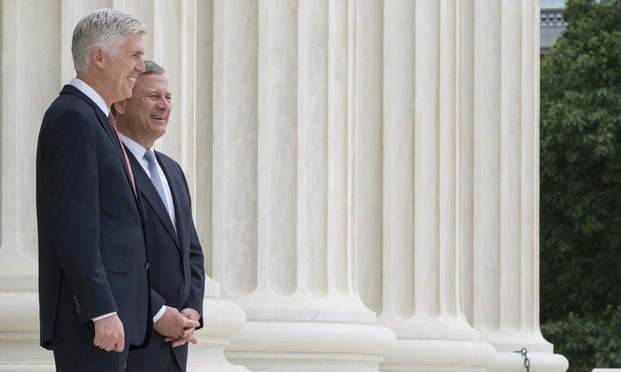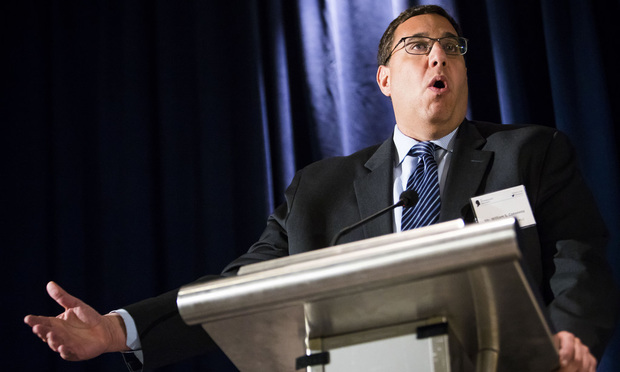SCOTUS Sets Trump Tax Return Cases for March Argument Session
The justices granted review in a trio of cases—"Trump v. Vance," "Trump v. Mazars" and "Trump v. Deutsche Bank"—in which federal appellate courts in New York and Washington rejected the president's arguments to shield financial records from law enforcement and congressional investigators.
December 13, 2019 at 04:41 PM
4 minute read
The original version of this story was published on National Law Journal
 Justice Neil Gorsuch and Chief Justice John Roberts Jr. Credit: Diego M. Radzinschi / NLJ
Justice Neil Gorsuch and Chief Justice John Roberts Jr. Credit: Diego M. Radzinschi / NLJ
The U.S. Supreme Court on Friday agreed to decide whether President Donald Trump must comply with subpoenas for his financial documents from a New York grand jury and from U.S. congressional committees.
The justices granted review in a trio of cases—Trump v. Vance, Trump v. Mazars and Trump v. Deutsche Bank—in which federal appellate courts in New York and Washington rejected the president's arguments to shield financial records from law enforcement and congressional investigators. Then-candidate Trump vowed to release those records, but has since refused.
The announcement, which set arguments for the March session, adds blockbuster cases to a docket already teeming with disputes that could deliver far-reaching consequences on immigration, workplace equality and abortion rights.
The New York grand jury subpoena, issued by Manhattan District Attorney Cyrus Vance Jr., stems from a state grand jury investigation into allegations that the president paid hush money to two women through his former lawyer Michael Cohen before the 2016 election.
Trump's counsel, William Consovoy of Washington's Consovoy McCarthy, had argued that Trump had "temporary presidential immunity" from investigations and prosecutions while in office.
The U.S. Court of Appeals for the Second Circuit last month, in an opinion by Chief Judge Robert Katzmann, unanimously upheld the subpoena. "The subpoena at issue is directed not at the President, but to his accountants; compliance does not require the president to do anything at all," the appeals court said.
The petition challenging the grand jury subpoena was filed by Trump's personal lawyer, Jay Alan Sekulow, along with Consovoy.
The court consolidated two cases—one from the D.C. Circuit and one from the Second Circuit—in which U.S. congressional committees are seeking records from Mazars, Deutsche Bank and Capital One.
The U.S. House Oversight and Reform Committee issued the subpoena at issue in Trump v. Mazars. Mazars is Trump's longtime accounting firm. The Supreme Court last month, in an unsigned order, put the subpoena temporarily on hold until Trump's lawyers filed a formal petition challenging the D.C. Circuit's ruling.
The House subpoena was triggered by testimony from Cohen during the House committee's hearing in February. Cohen alleged that Trump had inflated and deflated his assets on personal financial statements to obtain a bank loan and to reduce his New York real estate taxes and insurance premiums.
A divided D.C. Circuit panel ruled that the House had a legitimate legislative purpose in seeking the tax records because "it seeks information important to determining the fitness of legislation to address potential problems within the executive branch and the electoral system; it does not seek to determine the president's fitness for office."
 William S. Consovoy. Credit: Diego M. Radzinschi / ALM
William S. Consovoy. Credit: Diego M. Radzinschi / ALMConsovoy argued in his petition that the committee's investigation of Trump for wrongdoing was not a legitimate legislative purpose but, instead, was "an attempt to exercise a law-enforcement power beyond Congress's legislative purview."
House general counsel Douglas Letter, in his response urging the justices to deny review, told the high court, "This court has repeatedly upheld Congress's ability to issue legislative subpoenas and has 'unequivocally and emphatically endorsed' the view that 'a subpoena duces tecum could be directed to the president,' and that the president may be subject even to process issued by a private citizen."
The justices also agreed to hear Trump's appeal of two subpoenas issued by House committees seeking financial documents related to Trump's businesses and certain of his relatives. A divided Second Circuit panel ruled in December that Deutsche Bank and Capital One had to provide nearly a decade worth of tax returns and other documents.
Read more:
Trump's Lawyers Make Their Case at SCOTUS to Keep Financial Records Secret
'No One Is Above the Law': Judge Says McGahn Must Comply With House Subpoena
White House Counsel Isn't 'Personal Lawyer' to President, McGahn Asserts
'Existential Threat': House Report Bashes Cipollone's Impeachment Defiance
As Trump Stonewalls on Ukraine Docs, FOIA Suits Seek to Pry Them Loose
A Judge Didn't Sound Eager to Throw Out House Suit Seeking Trump Tax Returns
This content has been archived. It is available through our partners, LexisNexis® and Bloomberg Law.
To view this content, please continue to their sites.
Not a Lexis Subscriber?
Subscribe Now
Not a Bloomberg Law Subscriber?
Subscribe Now
NOT FOR REPRINT
© 2025 ALM Global, LLC, All Rights Reserved. Request academic re-use from www.copyright.com. All other uses, submit a request to [email protected]. For more information visit Asset & Logo Licensing.
You Might Like
View All
With DEI Rollbacks, Employment Lawyers See Potential For Targeting Corporate Commitment to Equality
7 minute read
MoFo Associate Sees a Familiar Face During Her First Appellate Argument: Justice Breyer

Amid the Tragedy of the L.A. Fires, a Lesson on the Value of Good Neighbors
Trending Stories
- 1SurePoint Acquires Legal Practice Management Company ZenCase
- 2Day Pitney Announces Partner Elevations
- 3The New Rules of AI: Part 2—Designing and Implementing Governance Programs
- 4Plaintiffs Attorneys Awarded $113K on $1 Judgment in Noise Ordinance Dispute
- 5As Litigation Finance Industry Matures, Links With Insurance Tighten
Who Got The Work
J. Brugh Lower of Gibbons has entered an appearance for industrial equipment supplier Devco Corporation in a pending trademark infringement lawsuit. The suit, accusing the defendant of selling knock-off Graco products, was filed Dec. 18 in New Jersey District Court by Rivkin Radler on behalf of Graco Inc. and Graco Minnesota. The case, assigned to U.S. District Judge Zahid N. Quraishi, is 3:24-cv-11294, Graco Inc. et al v. Devco Corporation.
Who Got The Work
Rebecca Maller-Stein and Kent A. Yalowitz of Arnold & Porter Kaye Scholer have entered their appearances for Hanaco Venture Capital and its executives, Lior Prosor and David Frankel, in a pending securities lawsuit. The action, filed on Dec. 24 in New York Southern District Court by Zell, Aron & Co. on behalf of Goldeneye Advisors, accuses the defendants of negligently and fraudulently managing the plaintiff's $1 million investment. The case, assigned to U.S. District Judge Vernon S. Broderick, is 1:24-cv-09918, Goldeneye Advisors, LLC v. Hanaco Venture Capital, Ltd. et al.
Who Got The Work
Attorneys from A&O Shearman has stepped in as defense counsel for Toronto-Dominion Bank and other defendants in a pending securities class action. The suit, filed Dec. 11 in New York Southern District Court by Bleichmar Fonti & Auld, accuses the defendants of concealing the bank's 'pervasive' deficiencies in regards to its compliance with the Bank Secrecy Act and the quality of its anti-money laundering controls. The case, assigned to U.S. District Judge Arun Subramanian, is 1:24-cv-09445, Gonzalez v. The Toronto-Dominion Bank et al.
Who Got The Work
Crown Castle International, a Pennsylvania company providing shared communications infrastructure, has turned to Luke D. Wolf of Gordon Rees Scully Mansukhani to fend off a pending breach-of-contract lawsuit. The court action, filed Nov. 25 in Michigan Eastern District Court by Hooper Hathaway PC on behalf of The Town Residences LLC, accuses Crown Castle of failing to transfer approximately $30,000 in utility payments from T-Mobile in breach of a roof-top lease and assignment agreement. The case, assigned to U.S. District Judge Susan K. Declercq, is 2:24-cv-13131, The Town Residences LLC v. T-Mobile US, Inc. et al.
Who Got The Work
Wilfred P. Coronato and Daniel M. Schwartz of McCarter & English have stepped in as defense counsel to Electrolux Home Products Inc. in a pending product liability lawsuit. The court action, filed Nov. 26 in New York Eastern District Court by Poulos Lopiccolo PC and Nagel Rice LLP on behalf of David Stern, alleges that the defendant's refrigerators’ drawers and shelving repeatedly break and fall apart within months after purchase. The case, assigned to U.S. District Judge Joan M. Azrack, is 2:24-cv-08204, Stern v. Electrolux Home Products, Inc.
Featured Firms
Law Offices of Gary Martin Hays & Associates, P.C.
(470) 294-1674
Law Offices of Mark E. Salomone
(857) 444-6468
Smith & Hassler
(713) 739-1250







